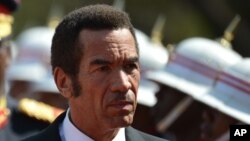Zimbabweans living in Botswana say they support their government’s effort to engage its neighbor on corporal punishment. Botswana regularly flogs transgressing Zimbabweans, particularly for border jumping and petty crime.
Zimbabwe recently engaged their Botswana counterparts with a view to stop the flogging of its citizens in the neighboring nation.
However, the Zimbabwe delegation, during a recent bilateral security meeting, failed to convince Gaborone authorities to stop the punishment.
Zimbabweans, who commit petty crime in Botswana, are usually flogged and not given custodial sentence.
Some Zimbabweans feel the practice is outdated and should be replaced with alternative punishment. Japhta Ndlovu says with some people suffering from various ailments, punishment through flogging might even cause health complications.
"We don't support the system of canning. I think they should come up with another alternative. We have people with different ailments and it might be a problem after they are flogged."
But another Zimbabwean, Farai Dzirutwe, is of the view that although some are not comfortable with the practice, Zimbabweans must try and stay on the right side of the law to avoid falling victim to corporate punishment.
"I would like to encourage Zimbabweans to ensure their papers are in order. Even if we say it’s inhumane or backward, its within Botswana laws."
Botswana nationals believe it is only appropriate to mete out the punishment to deter petty criminals, particularly with Zimbabwean illegal immigrants accused of contributing to soaring crime in the country.
Mompati Kenosi says Botswana “laws are laws” and they need to be respected irrespective of nationality. “Flogging has its advantages. It doesn't matter whether they are Zimbabweans or not. We need to flog people for minor crimes instead of putting them in jail.”
Zimbabwe Republic Police head of the Minerals and Border Control Unit, Earnest Muchekwa, recently told the media that they held several meetings with their Botswana counter-parts over the matter but the practice had not stopped.
Muchekwa says they have repeatedly impressed the need to observe human rights but have been told that Batswana chiefs have a legal right to flog offenders.
Offenders are often sentenced to anything between six and 12 cuts on the bare back but children, women and men over 40 years are excluded.






